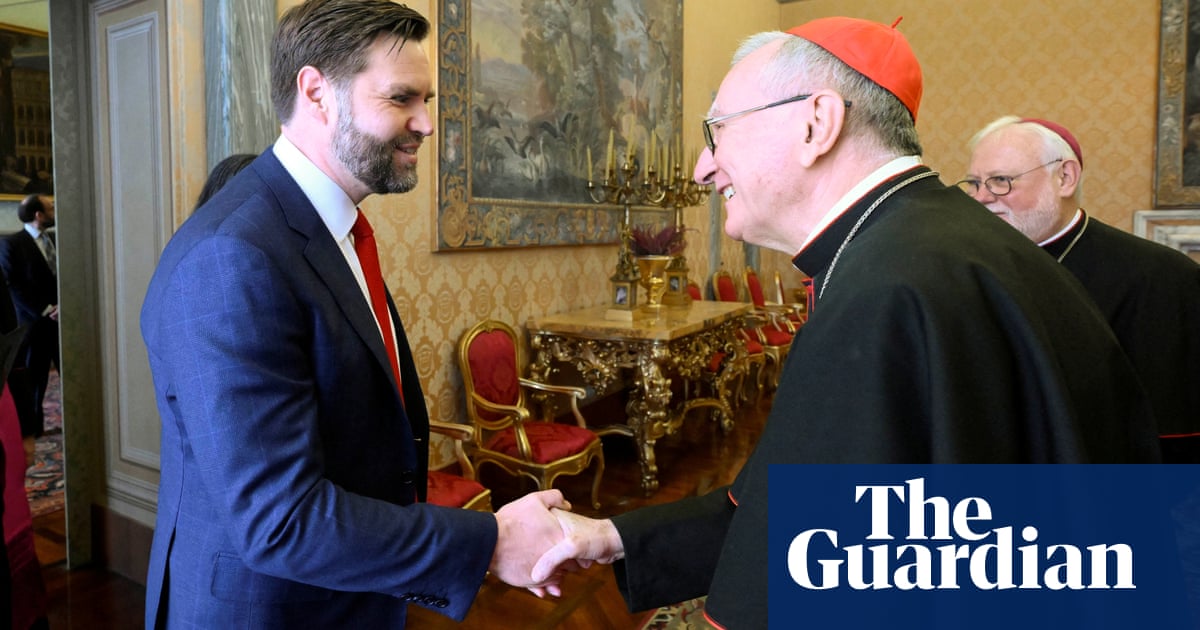The US vice-president,JD Vance, had “an exchange of opinions” with the Vatican’s secretary of state over current international conflicts and immigration when they met on Saturday, the Vatican has said.
The Vatican issued a statement after Vance, a Catholic convert, met Cardinal Pietro Parolin and the foreign minister, Archbishop Paul Gallagher. There was no indication he metPope Francis, who has resumed some official duties during his recovery from pneumonia.
The Holy See has responded cautiously to theTrump administration, in keeping with its tradition of diplomatic neutrality.
It has expressed alarm over Donald Trump’s crackdown on immigration and cuts in international aid, and has called for peaceful resolutions to the wars inUkraineand Gaza.
Those concerns were reflected in theVaticanstatement, which said the talks were cordial and that the Vatican expressed satisfaction with the administration’s commitment to protecting freedom of religion and conscience.
“There was an exchange of opinions on the international situation, especially regarding countries affected by war, political tensions and difficult humanitarian situations, with particular attention to migrants, refugees, and prisoners,” the statement said.
“Finally, hope was expressed for serene collaboration between the state and the Catholic church in the United States, whose valuable service to the most vulnerable people was acknowledged.”
The reference to “serene collaboration” appeared to refer to Vance’s accusation that the US conference of Catholic bishops was resettling “illegal immigrants” in order to obtain federal funding. Top US cardinals have pushed back strongly against the claim.
Parolin told La Repubblica on the eve of Vance’s visit: “It is clear that the approach of the current US administration is very different from what we are used to and, especially in the west, from what we have relied on for many years,.”
As the US pushes to end the war in Ukraine, Parolin reaffirmed Kyiv’s right to its territorial integrity and insisted that any peace deal must not be “imposed” on Ukraine but “built patiently, day by day, with dialogue and mutual respect”.
Vance was spending Easter weekend in Rome with his family and attended Good Friday services in St Peter’s Basilica after meeting Italy’s prime minister, Giorgia Meloni. On Saturday, after the Vance family’s introduction to Parolin, they had a private tour of the Sistine Chapel.
It was not immediately clear where they would celebrate Easter. Pope Francis, for his part, according to official liturgical plans released on Saturday, indicated he hoped to attend Easter mass on Sunday, which usually draws thousands to St Peter’s Square.
The pope and Vance have tangled over immigration and the Trump administration’s plans to deport people en masse. Francis has made caring for those who migrate a hallmark of his papacy and his progressive views on social justice issues have often put him at odds with members of the more conservative US Catholic church.
The pope also changed church teaching to say that capital punishment was inadmissible in all cases. After a public appeal from Francis just weeks before Trump took office, Joe Biden commuted the sentences of 37 of the 40 people on federal death row. Trump is an outspoken proponent of expanding capital punishment.
Sign up toHeadlines Europe
A digest of the morning's main headlines from the Europe edition emailed direct to you every week day
after newsletter promotion
Vance, who converted toCatholicismin 2019, identifies with a small Catholic intellectual movement that is viewed by some critics as having reactionary or authoritarian leanings and often described as “post-liberal”.
Post-liberals share some longstanding Catholic conservative views, such as opposition to abortion and LGBTQ+ rights. They envision a counter-revolution in which they take over government bureaucracy and institutions such as universities from within, replacing entrenched “elites” with their own and acting upon their vision of the “common good”.
Just days before the pope was admitted to hospital in February, Francis criticised the Trump administration’s deportation plans, warning that they would deprive people of their inherent dignity. In a letter to US bishops, he also appeared to respond to Vance directly for having claimed that Catholic doctrine justified such policies.
Vance had defended the administration’s America-first crackdown by citing a concept from medieval Catholic theology known in Latin asordo amoris. He said the concept delineated a hierarchy of care – to family first, followed by neighbour, community, fellow citizens and, last, those elsewhere.
In his 10 February letter, Francis appeared to correct Vance’s understanding of the concept.
“Christian love is not a concentric expansion of interests that little by little extends to other persons and groups,” he wrote. “The trueordo amoristhat must be promoted is that which we discover by meditating constantly on the parable of the good Samaritan, that is, by meditating on the love that builds a fraternity open to all, without exception.”
Vance has acknowledged Francis’ criticism but has said he will continue to defend his views. During an appearance on 28 February at the National Catholic Prayer Breakfast in Washington, Vance did not address the issue specifically but called himself a “baby Catholic” and acknowledged there are “things about the faith that I don’t know”.
